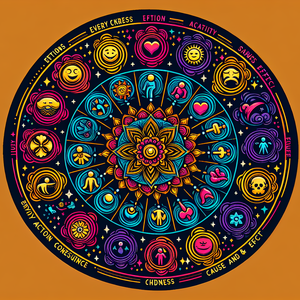The Art of Language: Exploring the Beauty in Translation

Translation transcends the mechanical process of word-for-word conversion. It is a nuanced art that demands an understanding of the original text's intent, tone, and cultural significance. A translator acts as an interpreter, navigating the delicate balance between fidelity to the source material and the need to create an engaging narrative for the target audience. The most accomplished translations breathe new life into texts, allowing them to resonate with readers from diverse backgrounds.
The Role of Emotions and Nuances
At the heart of translation lies the challenge of conveying emotions and nuances. A simple phrase in one language may carry a wealth of meaning that is difficult to encapsulate in another. For instance, the French term "joie de vivre," which translates to "joy of living," embodies a cultural attitude that might require more than a direct translation to fully convey its vibrancy and depth. Effective translators employ creativity and intuition, often choosing words and phrases that evoke the same feelings in the target language, rather than simply sticking to literal translations.
Celebrated Translators and Their Craft
Throughout literary history, numerous translators have left an indelible mark on the world by introducing foreign works to new audiences. Gregory Rabassa, for example, is renowned for his translation of Gabriel García Márquez's "One Hundred Years of Solitude." Rabassa's skillful rendering of Márquez's magic realism has been recognized as a monumental achievement, allowing readers to experience the same emotional depth as those who read the original Spanish text. His translation not only preserved the story's essence but also enhanced its lyrical quality, demonstrating the transformative power of a skilled translator.
The Challenge of Cultural Context
One of the most significant challenges in translation is conveying cultural references and idiomatic expressions. Language is a reflection of culture, and certain phrases may carry connotations that do not translate easily. The Japanese word "komorebi," which describes the effect of sunlight filtering through leaves, lacks a direct equivalent in English. A talented translator must find ways to convey not just the meaning but also the emotion and imagery associated with such terms.
Celebrating Beautifully Translated Works
Numerous works of literature have been beautifully translated, allowing readers to appreciate the richness of international authorship. Haruki Murakami's novels, translated by Philip Gabriel and others, serve as prime examples of how a translator can capture the surreal and dreamlike quality of an author's prose. The fluidity and rhythm of the English translations have garnered acclaim, enabling Murakami's unique voice to resonate globally.
Translation is an art form that transcends mere language conversion. It is a complex and creative endeavor that requires not only linguistic skill but also cultural sensitivity and emotional insight. The work of skilled translators illuminates the beauty of original texts, allowing readers to engage with diverse perspectives and experiences.
Literary Translator
Publishing houses, literary agencies, and independent authors
Core Responsibilities
Translate literary works from one language to another while maintaining the original tone, style, and cultural nuances.
Collaborate with authors and editors to ensure fidelity to the source material and clarity in the target language.
Conduct thorough research on cultural references and idiomatic expressions to ensure accurate and engaging translations.
Required Skills
Proficiency in at least two languages with a deep understanding of literary styles and cultural contexts.
Strong creative writing skills to effectively convey emotions and subtleties.
Experience in translating poetry or prose, with a portfolio showcasing previous work.
Localization Specialist
Tech companies, e-commerce platforms, and international marketing agencies
Core Responsibilities
Adapt content for specific markets, ensuring cultural relevance and linguistic accuracy across various digital platforms.
Work with product teams to localize software, websites, and marketing materials for global audiences.
Conduct user testing to assess the effectiveness of localized content.
Required Skills
Familiarity with localization tools and software (e.g., SDL Trados, Memsource).
Understanding of internationalization practices and cultural nuances.
Background in marketing or user experience design is a plus.
Translation Project Manager
Translation agencies, multinational corporations, and NGOs
Core Responsibilities
Oversee translation projects from inception to completion, ensuring timelines and budgets are met.
Coordinate between translators, editors, and clients to facilitate smooth communication and project flow.
Implement quality assurance processes to ensure high standards of translation are maintained.
Required Skills
Strong organizational and multitasking abilities to manage multiple projects simultaneously.
Excellent communication and interpersonal skills for liaising with diverse teams.
Familiarity with project management software and translation memory tools.
Subtitler/Captioner
Media production companies, streaming services, and educational institutions
Core Responsibilities
Create subtitles and captions for films, television shows, and online videos, ensuring timing and readability.
Translate spoken dialogue while maintaining context, tone, and cultural references.
Work closely with production teams to adapt content for different audiences and accessibility needs.
Required Skills
Strong command of source and target languages, with an emphasis on audiovisual translation.
Attention to detail and excellent time management skills to meet tight deadlines.
Familiarity with subtitling software (e.g., Aegisub, Subtitle Edit) is beneficial.
Terminologist
Translation agencies, multinational corporations, and research institutions
Core Responsibilities
Develop and maintain glossaries of terms for specific industries or fields, ensuring consistency in translation.
Collaborate with translators and subject matter experts to identify and resolve terminology issues.
Conduct research to stay updated on industry-specific language trends and developments.
Required Skills
In-depth knowledge of specialized fields (e.g., legal, medical, technical) and their corresponding terminologies.
Excellent analytical skills to assess language use and document standards.
Proficiency in terminology management software and databases.


